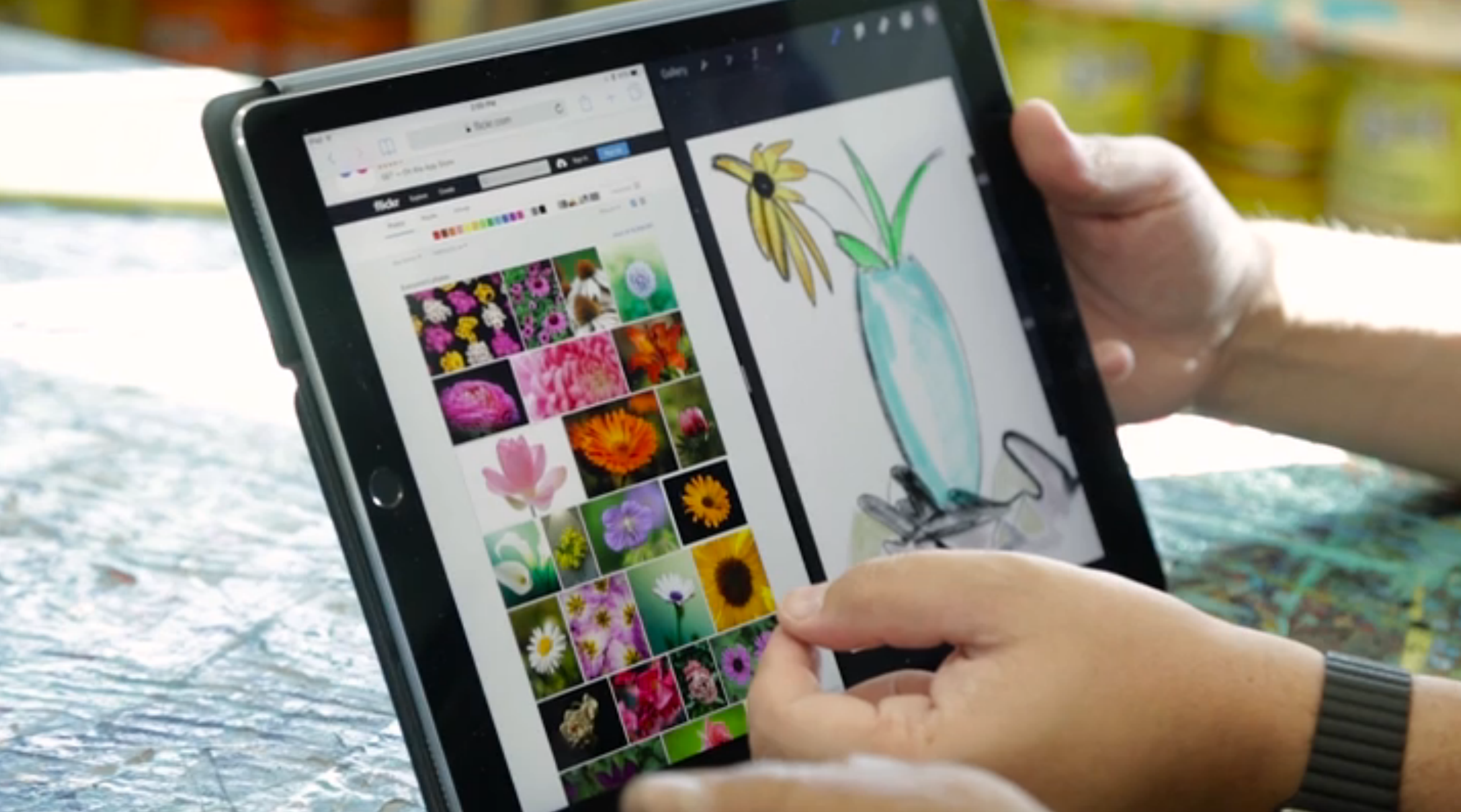
What Is It?
Never has the cry of ‘it’s just a bigger Apple thing’ been more applicable than it has with iPad Pro – this is literally a bigger iPad. But that approach to thinking about it is also reductive. The Microsoft Surface has blazed a sort of hybrid path – for people that don’t want to compromise having a laptop experience. The iPad pro, on the other hand, is unapologetically tablety. The keyboard feels solid but it’s no substitute for a MacBook. The muti-app experience, on the other hand, is far and away better than on any competing system — and the way that it enables creatives to alternate between the various ‘modes’ is unique to this platform.
By the way, the A9X chip provides a performance curve that is so brutally efficient that if this isn’t an audition for a fully A-series-powered lineup of Macs I will eat my hat.
There are a lot of ways to slice iPad Pro. But one of the biggest and hardest to quantify is the way that it will end the debate about whether the tablet is a tool for creation once and for all.
As for it being a replacement for a desktop or laptop — the technorati may hitch their pants and stomp around in a haze of jargon arguing that Microsoft couldn’t figure it out so how will Apple. But out there in the real world people are using tablets and phones exclusively. My wife hasn’t had a ‘home personal computer’ outside of a phone and tablet in years. She’s used my desktop and/or laptop perhaps once or twice a month, at most, and usually only because they’re handy. Since the iPad Pro has been around the house, that’s gone down even further. The screen real estate, along with the precision of the Pencil, has made the Pro more than enough computer for her needs, especially with the handy keyboard.
Look. I get it. There are completely valid arguments for why statements like Tim Cook’s ‘end of the PC’ quote yesterday could be considered marketing hype or delusion. But there is a bigger issue. I am absolutely fed up with tech bloggers and technical writers assuming that all people use computers the way they do. There is no longer just the ‘truck’ of the desktop and laptop and the ‘car’ of the phone. There are gradations of tone in between, and the iPad Pro absolutely, 100% could be the central computing device for a home. Many days, I run TechCrunch from my phone. On those days, the ‘traditional’ computers in my household lie dormant, completely. If you think this is an edge case, you are blinding yourself to the way the world has changed.
Instead of dwelling on whether an iPad or tablet can do exactly what a laptop or desktop does, we need to ask ourselves what can it do differently, or better. Not what it can duplicate — what it can enable.
When you talk about software eating the world, it’s important to acknowledge where that software is ending up. It’s in apps. On mobile devices and the mobile web. And it’s not just in homes. Enterprises prefer apps for myriad reasons like security, ease of distribution and access control. This is happening, it’s just happening in the very broad ‘margins’ away from the societal and geographical ‘centers’ of tech.
Replacement cycles, also a matter of obsession when it comes to sales predictions, are still an unknown quantity when it comes to iPad. No one knows how long people will really keep iPads, not even Apple. Phone replacement cycles aren’t a model, and neither are traditional computing models. iPads have little to no known malware, no bloatware to make a machine run slower, strict allowances for utilizing standing system resources and known hardware. What happens when you have a capable general consumer computing device, with no moving parts and software that is designed explicitly for the maximum capabilities of the device and no more? No one knows. It’s literally never happened before.
It’s going to take some time and experimentation to figure this out. Despite my irritation at the way that the tablet space is analyzed, I am not willing to declare the personal computer (non-Cupertino definition) ‘dead’. I’ll leave that to the bombasts. But there is a certain (sorry) norm-core computing demographic that could very well end up with an iPad Pro as the ’enhanced’ component to their smartphone, which is their real computer. Somewhere on the same level as other use-case-based devices like wearables and an interconnected home.
If you are a company that is not exploring that, as Apple is, and as Microsoft is, then you should probably look into a career in tech blogging.


Comments are closed.